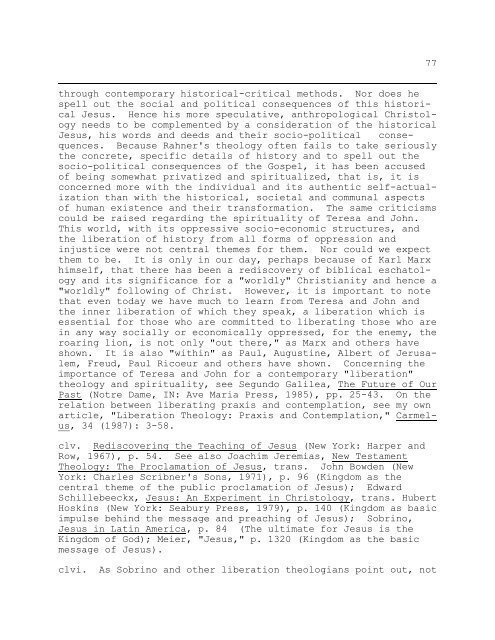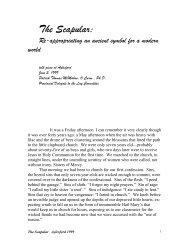Christocentrism of Charism – Buggert - CarmelStream
Christocentrism of Charism – Buggert - CarmelStream
Christocentrism of Charism – Buggert - CarmelStream
Create successful ePaper yourself
Turn your PDF publications into a flip-book with our unique Google optimized e-Paper software.
through contemporary historical-critical methods. Nor does he<br />
spell out the social and political consequences <strong>of</strong> this historical<br />
Jesus. Hence his more speculative, anthropological Christology<br />
needs to be complemented by a consideration <strong>of</strong> the historical<br />
Jesus, his words and deeds and their socio-political consequences.<br />
Because Rahner's theology <strong>of</strong>ten fails to take seriously<br />
the concrete, specific details <strong>of</strong> history and to spell out the<br />
socio-political consequences <strong>of</strong> the Gospel, it has been accused<br />
<strong>of</strong> being somewhat privatized and spiritualized, that is, it is<br />
concerned more with the individual and its authentic self-actualization<br />
than with the historical, societal and communal aspects<br />
<strong>of</strong> human existence and their transformation. The same criticisms<br />
could be raised regarding the spirituality <strong>of</strong> Teresa and John.<br />
This world, with its oppressive socio-economic structures, and<br />
the liberation <strong>of</strong> history from all forms <strong>of</strong> oppression and<br />
injustice were not central themes for them. Nor could we expect<br />
them to be. It is only in our day, perhaps because <strong>of</strong> Karl Marx<br />
himself, that there has been a rediscovery <strong>of</strong> biblical eschatology<br />
and its significance for a "worldly" Christianity and hence a<br />
"worldly" following <strong>of</strong> Christ. However, it is important to note<br />
that even today we have much to learn from Teresa and John and<br />
the inner liberation <strong>of</strong> which they speak, a liberation which is<br />
essential for those who are committed to liberating those who are<br />
in any way socially or economically oppressed, for the enemy, the<br />
roaring lion, is not only "out there," as Marx and others have<br />
shown. It is also "within" as Paul, Augustine, Albert <strong>of</strong> Jerusalem,<br />
Freud, Paul Ricoeur and others have shown. Concerning the<br />
importance <strong>of</strong> Teresa and John for a contemporary "liberation"<br />
theology and spirituality, see Segundo Galilea, The Future <strong>of</strong> Our<br />
Past (Notre Dame, IN: Ave Maria Press, 1985), pp. 25-43. On the<br />
relation between liberating praxis and contemplation, see my own<br />
article, "Liberation Theology: Praxis and Contemplation," Carmelus,<br />
34 (1987): 3-58.<br />
clv. Rediscovering the Teaching <strong>of</strong> Jesus (New York: Harper and<br />
Row, 1967), p. 54. See also Joachim Jeremias, New Testament<br />
Theology: The Proclamation <strong>of</strong> Jesus, trans. John Bowden (New<br />
York: Charles Scribner's Sons, 1971), p. 96 (Kingdom as the<br />
central theme <strong>of</strong> the public proclamation <strong>of</strong> Jesus); Edward<br />
Schillebeeckx, Jesus: An Experiment in Christology, trans. Hubert<br />
Hoskins (New York: Seabury Press, 1979), p. 140 (Kingdom as basic<br />
impulse behind the message and preaching <strong>of</strong> Jesus); Sobrino,<br />
Jesus in Latin America, p. 84 (The ultimate for Jesus is the<br />
Kingdom <strong>of</strong> God); Meier, "Jesus," p. 1320 (Kingdom as the basic<br />
message <strong>of</strong> Jesus).<br />
clvi. As Sobrino and other liberation theologians point out, not<br />
77



